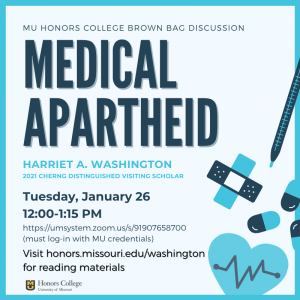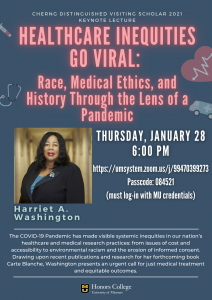The University of Missouri Honors College hosted a week with science writer and ethicist Harriet Washington, who brought to light contemporary issues in American medicine.

Courtesy of Yale University Press
Washington is most well-known for her work on the intersections of medical ethics and racism, how those facets play out in the doctor-patient experience, the application of medical technology, medical experimentation (often without informed consent), and bioethics.
She has been a research fellow at Harvard T. H. Chan School of Public Health, a visiting scholar and professor at Columbia University, DePaul University College of Law, a fellow at the University of Nevada, and a research scholar at Tuskegee University and Stanford University.
Two of her recent works, Medical Apartheid: The Dark History of Medical Experimentation on Black Americans from Colonial Times to the Present (2006, National Book Critics Circle Award) and A Terrible Thing to Waste: Environmental Racism and Its Assault on the American Mind (2019) have been pathbreaking works in offering explanations for how our system continues to perpetuate systemic inequities, and a disparity of outcomes for the nation’s Blacks, Latinos, and Native Americans.
Virtual events included two Brown Bag events and a public lecture on January 26, 27, and 28, 2021. Check out the recording of the Zoom Keynote Lecture below.
Her virtual visit was supported by the Andrew and Peggy Cherng Fund for Honors and the Panda Charitable Foundation.
Itinerary
Tuesday, January 26
Brown Bag, Medical Apartheid
Wednesday, January 27
Brown Bag, A Terrible Thing to Waste
Thursday, January 28
Keynote Lecture, “Healthcare Inequities Go Viral: Race, Medical Ethics, and History Through the Lens of a Pandemic”
The COVID-19 Pandemic has made visible systemic inequities in our nation’s healthcare and medical research practices: from issues of cost and accessibility to environmental racism and the erosion of informed consent. Drawing upon recent publications and research for her forthcoming book Carte Blanche, Harriet Washington presents an urgent call for just medical treatment and equitable outcomes.


